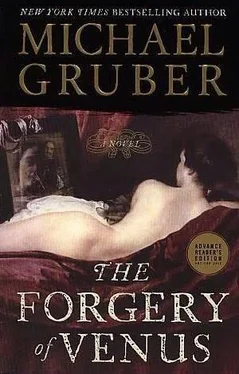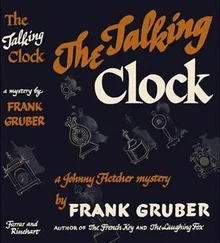He looked into my eyes and grinned.
“Third we have the unconscious body, the source of dreams and, we think, also of creativity. It is the task of the mystics to merge the second with the third body to find the soul, as they would put it. Those who accomplish this are the only ones who are truly awake-everyone else is a robot enslaved to the mass mind, as pumped out by the media or established by social norms. Then fourth is the magical body, by which adepts can be in two places at once or walk through walls or heal the sick or curse their enemies. Finally there is the spiritual body, which Hegel called the zeitgeist. The one who can control all the other bodies and also controls history.”
“You believe all this?”
He shrugged. “It’s just a theory. But it does explain some things. It explains how you could become Velázquez. It helps to explain why the most cultivated and educated nation in Europe should have submitted itself happily and enthusiastically to the absolute power of an ill-bred corporal. I can tell you, Wilmot, I was there, just a boy perhaps, but I was there . I felt the power. For my first years of conscious life I was living entirely in someone else’s dream, and my father, who is no fool, was the same. Even now, it is hard for me to believe that such power was entirely of this world. And when it was over, as soon as he blew out his brains, I felt a sense of release, of waking out of a long dream, and every German who was conscious at the time will tell you the same story. We looked around at the ruins and asked ourselves, how did this happen? How did ordinary Germans do such terrible things? Some people have argued that Germans are naturally brutal and undemocratic, at your knees or at your throat, as they say, but this is unsatisfying. The French terrified Europe for far longer than the Germans ever did, and they are always held up as the model of civilization, and the Scandinavians were monsters of destruction for three centuries and are all lambs up there now and don’t hurt a fly. And besides that, if we are naturally so awful, how come we are today the least militaristic nation on earth? So my point is that, if such a mysterious and unexpected thing could happen to a whole nation, I think that when a man tells me he is living for periods in a different time and having the thoughts of a man long dead, I say, why not?”
“Yeah, easy for you to say.”
“I appreciate your difficulty, my friend. But on the other hand, even without, let us say, artificial means of enhancement, you would still be a dweller in mystery. You remember what Duchamp said about art: ‘Only one thing in art is valid-that which cannot be explained.’ I think even your Dr. Zubkoff would agree that the creative capacities of the human mind remain beyond human explanation. And I’ll tell you this, Wilmot. I am a very successful man-that is, I have as much money as I require, and my family, such as remains, is well provided for. I have enough experience with men who have vastly more wealth to convince me that I am not this type, I am not interested in accumulating more money than I can possibly spend in a lifetime. I do not dream of the Werner Krebs Museum or the Krebs Trust doing the good works. I scheme and deal, I buy and sell-this is for more years than you have been alive, I think-and I confess, life becomes a little dull, and in my secret thoughts I say to myself, maybe I shall grow careless and end up in prison or dead. This is exciting for some time, but even this fades, and really, I would rather not be imprisoned or dead. So what shall I do? I don’t know. And then, as from nowhere, comes Charles P. Wilmot, Jr., into my life, and suddenly I am as a boy again selling my first stolen painting.”
I said, “I’m glad you’re happy, Mr. Krebs.” And I was. I had a pretty good idea about what it was like if Krebs was not happy with you.
“I am. I tell you what is most remarkable about you, Wilmot. You are a genius, but you are not a son of a bitch. I have dealt with these before now and it is no fun. But I like you, I really do. And we are going to have fun, a lot of fun, you and I. There is something I have been longing to do for over fifty years that I believe you can help me accomplish, but…excuse me, I believe I must take this call.”
A little tune had played, Bach’s Toccata in D on a harpsichord, and Krebs pulled a cell phone from his inner pocket. He turned slightly away from me and spoke rapidly in German.
I finished my grappa, conscious of a strange feeling after this speech from Krebs, thinking about what Lotte had said about collectors falling in love with artists, and also about the doomed little girl that Frankenstein falls for, and also about Fay Wray and Kong. Lotte always used to quote a saying of La Rochefoucauld ’s that there were some situations in life that you have to be half crazy to escape from. If that were really true, I thought then, I should be just fine.
Two days later we moved to Madrid, occupying a couple of suites at the Villa Real. Our party was made up of the king (Krebs), the First Murderer (Franco), the Fool (me), and a new guy, the Second Murderer (Kellermann), who met us at the Madrid airport in the usual gangster Mercedes limo. I gathered he was an employee at Krebs’s secret mountain hideout in Bavaria, a large, polite blondie with nice teeth. Franco had nice teeth too, which you usually don’t see on Europeans. I asked him about it once and he told me that Herr Krebs insists on good dental care for all his staff, pays for it out of his own pocket. An unashamed patron is Herr Krebs, and it wouldn’t surprise me much to learn he arranged their marriages too.
All in all it was kind of neat to be part of Herr Krebs’s little court. The life of an international criminal is not a strenuous one, which is why it’s so popular. We rose late, ate well; Krebs and I toured the galleries and museums, strolled the temperate plazas at night, and ate tapas and heard music and discussed art on a high level.
Yes, nice indeed to be driven in a limo everywhere and to stay in this really snazzy hotel and never have to wonder about where you’re going. It was not that great being an American in Spain since the Iraq shit started and the Madrid metro bombings, and I detected dirty looks, subtle rudenesses, and obscene comments behind the backs of the Americans I saw strolling obliviously around this hotel.
Which was five-star, naturally, old on the outside, sleek as a fighter jet on the inside, furnished in leather and brushed steel, wired to the gills. Krebs told me I couldn’t make phone calls without permission, and I haven’t, but he didn’t say anything about e-mail. We had Wi-Fi in our suite and I was able to cruise the Web (all those sites about memory and craziness, although there does not seem to be an organization devoted to fixing what’s wrong with me) and communicate with my children, chatty e-mails from Milo with links to cool websites and videos, and from Rose I got, “hEllo DadDDy I am FIIN” with little drawing-program pictures attached. Lotte didn’t answer the ones I sent her.
And then one night we drove out to the west end of the city, to a commercial street on the other side of Bailén. In a vacant loft, lit bright as day by big portable worklights, we found a couple of familiar faces, Baldassare and Salinas from the Palacio de Livia museum. Salinas informed us that the tests of the paint samples had been perfect; the little scrape was chemically indistinguishable from similar ones taken from undoubted Velázquez paintings. He seemed sad when he said this-maybe he was having second thoughts, or maybe it was his curatorial faith in technology receiving a deadly blow. Anyway, we were obviously on to the next phase.
On a couple of big glass-topped tables pushed together I saw my Venus and another painting, just the same size, that looked a lot like The Miraculous Draught of Fishes by Jacopo Bassano, which hangs in the National Gallery in D.C. Both paintings had been taken off their stretchers and were laid flat on the tables, the Bassano weighted taut with small leather shot bags. I noticed that the fake Velázquez had been adhered in some way to a thick glass sheet somewhat larger than the painting. The air in the loft was close and smelled of old building, turps, and some chemical I couldn’t identify.
Читать дальше












